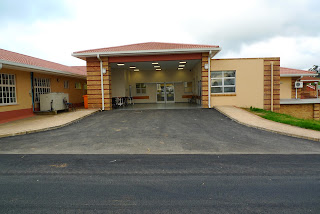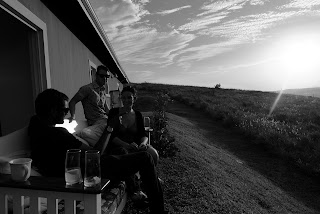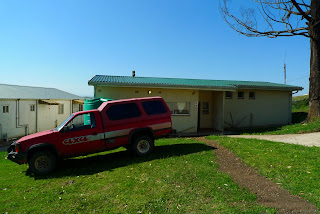Thursday 29th September 2011
Hello family, friends and curious folk, I have been missing you all. You may be pleased to hear that I arrived in South Africa safe and sound just over a week ago.
Just for a little orientation: I am working as a “Level 1 Medical Officer” at the Holy Cross Hospital, which is 20km outside the small and chaotic town of Flagstaff in the Eastern Cape Province. We’re situated about 40km from the coast, referred to locally as “the wild coast” for its sheer beauty and isolation. Holy Cross was set up in 1923 by some philanthropic missionaries. In the past decade it has undergone a massive rebuild and looks very modern and glam. Unfortunately, for what is has in glitz, it lacks in numbers of doctors and well trained clinical staff. The hospital has about 450 beds, but only around 250 to 300 are currently active. There is a casualty, out patients, a medical ward, a TB ward, a surgical ward, a paediatric ward, a maternity ward, a psychiatric ward and theatres. It serves a local population of about 300,000 and has satellite clinics to provide the people with basic health care as well as HIV and TB treatment and monitoring. For all this, the hospital has a mere 4 doctors, of which I am one. It’s the smallest amount for doctors the hospital has had in a long time. However, 3 more are coming later this year. 10 would be ideal, but 7 shall do for now. All the doctors live on site in houses within the hospital compound. I have a large 3 bedroom house to myself with lovely views over the rolling hills surrounding the hospital. So, plenty of space for visitors.
Since I landed, I have been through a lightning bolt induction and straight into the thick of it. I have been supervised by Dr Kakooza, the delightful and experienced Ugandan doctor who’s been running the show for almost two decades. So far, I have been left to my own devices in casualty where I have seen extremes from a heart sinking patient, younger than me, with advanced HIV and TB who died before I got to see him (quite a common situation) to the more absurd such as a gentleman who was bitten on the end of his penis by a spider.
During my fist week here I have admitted a child with a nasty snake bite; plenty of adults and children with large burns; pregnant women who just don't stop bleeding; managed poly trauma victims; incised and drained a large abscess, getting pus everywhere; administered spinal anaesthesia (under supervision); and all the things I am more used to such as diabetic ketoacidosis, chest infections, strokes etc. – however, even these conditions, which I am more than capable of dealing with, become difficult to manage in the way I am comfortable with. For example, I find that there are no BM stix to monitor blood sugars, meaning a sliding scale would be unsafe. So, one has to improvise to make sure things are done safely. Well, that’s the theory. I have so much to learn, particularly with regards to TB and HIV management, hence, I’ve spent most evenings reading about them. Of note, I haven’t seen one ECG since I arrived – we don’t have an ECG machine. Whether this is because heart disease is uncommon, despite the high prevalence or hypertension and diabetes, I do not know.
Rather than spending my first weekend exploring the local flora and fauna, I agreed to spend it on call with Dr Kakooza. A weekend on call means that you are on duty from 12:30pm on Friday afternoon until 8am Monday morning. The weekend was busy, but pretty uneventful until about 10pm on Saturday night when I had a phone call from the boss to see if I could give him a hand in casualty. I walked the 2 minute stroll down the hill to find that A&E was choc-a-bloc and an ambulance had just arrived with another 4 seriously injured patients – nearly all of whom were from a large road traffic accident involving one over laden vehicle. The dangers of not wearing a seat belt – kids, pay attention. There was also a handful of young men who decided to stab each other (very inconvenient) – it seems to me that they all know where to direct a lethal blow as the knife wounds were deep into the chest and abdomen. Why can't they just give each other a little poke in the arm or leg? Apparently the young men are taught how to kill someone when they go through an initiation from boy to man, i.e. having a ceremonial circumcision.
Before I arrived, Dr Kakooza had already attempted to resuscitate a 4 year old child with multiple long bone fractures – she died. I was greeted with massive deep lacerations, open fractures, open head injuries. It was insane, but once I got into the flow, there was a certain buzz about the whole evening. Together we pulled the breaks and applied plaster; washed and sutured the wounds and attempted to make sure no one was so critical that they needed transfer to a hospital with surgical facilities. We admitted about half of them. Pethidine is the drug of choice out here for pain relief, but I think a lot of the patients still had to bear stoical agony, although some not so stoical. There’s a distinct lack of morphine.
During my 2 years as a doctor I have never seen so much trauma, and all piled into one night. We triaged the patients ourselves, quickly seeing the sickest first – making sure they were alert, giving analgesia, IV fluids and blood in some cases. I attempted to treat each patient with the ATLS (Advanced Trauma Life Support) principles. However, needless to say, no one came adorned with a neck collar or on a spinal board and everyone complained of neck pain associated with plenty of distracting injuries and some alcohol on board. I did the best I could and stuck to my ABC’s. Fortunately no one we encountered (apart from the child, that died) had any immediate threat to life. It was a night for the orthopods, apart from the fact that there are no orthopaedic surgeons at Holy Cross.
Unfortunately for the orthopods, they’d have no xrays to look at. After hours and on the weekend, the hospital has no radiology or laboratory service. It’s clinical acumen all the way. I was so pleased I did the shift with Dr Kakooza (and I think despite his wealth of experience, he was grateful I was with him too). In normal conditions, at the moment with the shortage of medics, there would only be one doctor on call at the weekend.
In one night I learnt how tread water in relatively limited conditions . Throughout the pandemonium, there was relative calm and all the nursing staff, porters, security and cleaners all chipped in with a little encouragement. I kept a smile on my face and a click in my step.
I remember commenting last year whilst at King’s that doing medicine there felt as if one was constantly treading water and keeping the storm at bay. Well, I was wrong, that was a mere breeze. Here, the medical, and every other ward/department, is a full blown typhoon and it’s more like trying to bail out an already sinking ship. One analogy my boss used was: “It’s like the tap is broken and the water keeps running, so we keep mopping it up. However, what we need to do is find a way to turn off the mains, but no one has a wrench to do so.” It’s often the case that on the wards or in casualty, you’ll know what to do, but not have the resources or facilities to do it. For example, I admitted a young guy with probable meningitis. It was out of hours, so I couldn’t do a lumbar puncture, any bloods, imaging etc. It’s now two days since he was admitted, and I still haven’t been able to do any of the above. He’s on the right treatment though, and improving, so maybe that’s enough, but it doesn’t feel quite satisfactory. However, we are working to the best of our abilities and one has to be pragmatic about it all.
It’s not all chaos and pandemonium though. One of the most enchanting aspects of working here is the singing. Most mornings and occasionally at lunchtime you’ll see and hear the hospital staff standing around and singing gospel anthems. Now, maybe they should be attending to their clinical/clerical/whatever duties, but oh it is lovely and gives some light to the bedlam. For example, while there was a lull in casualty last Saturday evening the nurses all started singing. For the few minutes that it lasted, it gave me time to reflect on the day and take in all that had shot past. Luckily, there was an abscence of gun shot wounds that evening.
I’m not working this weekend, so maybe I’ll be able to explore some of the local surroundings.
Just one more thing, in answer to the statement that so many people posed before I left: “Wow, that’ll be an amazing experience “– I think you were right, it’s already turning out to be that. So, do you want to have an “amazing experience” too? As I mentioned earlier, the Holy Cross is in desperate need of more doctors, dentists, physios, dieticians, OT’s. Get involved and go tell the people at AHP (African Health Placements) that you want a job here. You can come and live in my house; I have space for two more.
I'll post some photos of the place soon. Internet is pretty non existent here.
If any of you get bored, please send me a letter/post card. It’ll be a nice distraction from reading my medical textbooks.
Dr Dominic Craver
Holy Cross Hospital
Private Bag X 1001
Flagstaff
4810
South Africa
Domxxx















